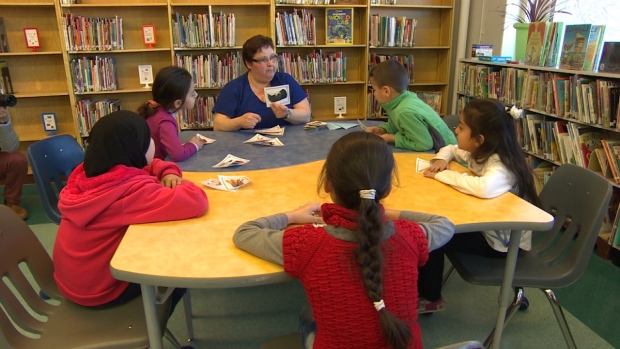Canadá/Enero de 2017/Fuente: CBC News
RESUMEN: Para los maestros de todo Canadá, el año pasado trajo nuevos retos a medida que miles de niños refugiados entraron al aula. Según Jan Stewart, profesor de la Facultad de Educación de la Universidad de Winnipeg, más de 20.000 de los refugiados sirios que se han establecido en Canadá tienen menos de 18 años y los juicios para maestros van desde barreras del lenguaje hasta trauma. Stewart, que escribió el libro Apoyando a los Niños Refugiados: Estrategias para Educadores, se ha embarcado en un nuevo estudio para conocer las necesidades especiales de salud mental de los estudiantes refugiados y cómo las escuelas pueden apoyar mejor a sus estudiantes. «El tema del trauma en el pasado de los estudiantes … si fue en Siria o también en Líbano, estamos viendo que el tipo de trauma lleva al lugar de asentamiento donde están tratando de lidiar con algunas de esas cuestiones», dijo Stewart dijo.
For teachers across Canada, the past year brought new challenges as thousands of refugee children entered the classroom.
More than 20,000 of the Syrian refugees who have settled in Canada are under the age of 18, and the trials for teachers range from language barriers to trauma, according to Jan Stewart, a professor in the faculty of education at the University of Winnipeg.
Stewart, who wrote the book Supporting Refugee Children: Strategies for Educators, has embarked on a new study to get a handle on what special mental health needs the refugee students have, and how schools can best support their students.
«The issue of trauma in the students’ past … whether it was in Syria or also in Lebanon, we’re seeing that the trauma kind of carries to the settlement place where they’re trying to deal with some of those issues,» Stewart said.
«And really, we’re struggling in classrooms to [find out] how best we can support these students and how can we provide teachers the background information they need.»
Students who have experienced trauma may not want to talk about what they’ve been through, and Stewart said mental health issues can carry a stigma.
«They just really want to be courageous and strong and they are saying, ‘There’s nothing wrong with me and I’m fine. This has just happened in the past,'» Stewart said.
At the same time, she said the students will matter-of-factly bring up stories about their communities and homes being bombed.
«Now we’re just starting to — in this particular group, now that the trust has been developed — get a better understanding of just how it has affected many of the students.»
Stewart said her meta-analysis of studies shows about 30 per cent of refugees are suffering from symptoms of post-traumatic stress disorder.
‘We want to learn English quickly’
Another issue that has emerged is classrooms where there are a number of refugee students all speaking the same language, she said. Many of the students are focused on learning language quickly, and pick it up faster when they are surrounded by English speakers.
«Some of the students are saying they’re going to quit school and move to another school because there are less Arabic speaking students. And that’s actually consistent from three of the sites that we’ve talked to students from,» Stewart said.
«It’s quite an interesting idea because you think that would be much more difficult for students to be immersed completely, but they are basically saying to us, ‘No, we want to do this. We want to learn English quickly.'»
She said students from the University of Winnipeg are working on a new program to help refugees with their English language skills.
Students ‘age out’
A lot of the students have also spent the last few years making money for their families rather than sitting in classrooms. They are already facing a drastic change once they arrive in Canada and now have to face an education gap, Stewart said.
«For many of these kids, they’re going to age out of our system, which means they’re going to be 21 and not permitted to be in school or high school anymore,» she said.
While many may continue on to an adult education program, Stewart said the more ideal approach would be to remove age caps in schools, which vary province to province.
«I think if there’s one thing we can do [it’s to] release the age cap. At least let the students stay in school and finish the high school requirements so that they can actually have a hope of moving to perhaps post-secondary education, or further training or even to a job,» she said.
Although there are hurdles to jump, Stewart said she is optimistic teachers are finding creative ways of addressing them.
«It’s something that we need to now be understanding a little bit better,» she said.
«So that’s part of my learning this past year, is to try to get as much information from experts around the world to try to say, ‘Okay, this is what we need to do to support students.'»
Fuente: http://www.cbc.ca/news/canada/manitoba/teachers-challenges-refugees-1.3910348






 Users Today : 100
Users Today : 100 Total Users : 35460006
Total Users : 35460006 Views Today : 145
Views Today : 145 Total views : 3418610
Total views : 3418610